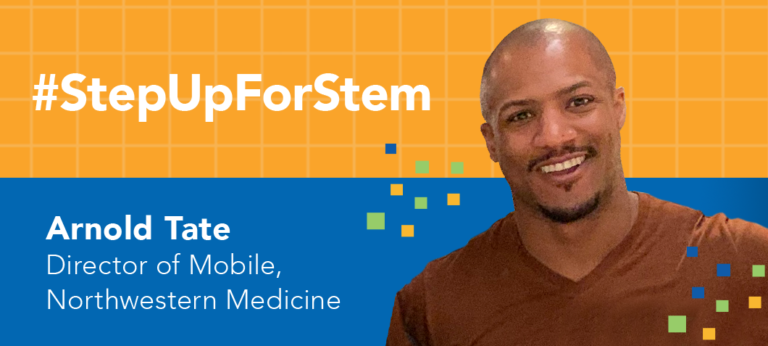MacGyver, Mobile Tech & Mentoring
Lumity corporate volunteer Arnold Tate has always been curious about how things work. “Growing up during the ‘MacGyver era,’ I was intrigued by how the character used simple objects to solve a problem, such as transforming rubber bands and straws into something extreme like a rocket. When cell phones became popular, I would play with settings and developer models to see what I could make them do,” Arnold told the Lumity team in a recent conversation.
Little did Arnold know his teenage pastime would lead to a career in tech—one that began in human resources. He then moved to stints in billing and tech support, which led to spearheading product development.
Learning from Lumity students
Now the Director of Mobile at Northwestern Medicine, Arnold, is also a Lumity Associate Board member and recent volunteer for our summer pre-apprenticeship program. This experience helps new high school graduates prepare for and obtain entry-level STEM positions with partnering companies. Arnold’s mentoring was invaluable for helping students connect their learning to the workplace. Arnold also credits Lumity students for teaching him as well. “It’s especially gratifying to have students tell me what they learned by working with me. I’m also a product manager through and through. I always think about the user and change my approach as I learn more about them. With the Lumity students, I put myself in their shoes and learned how to engage them quickly,” said Arnold. “I gained an understanding of who they are, what they need, and how the healthcare industry, where I’ve spent most of my career, can better engage and support them.”
Shining a light on STEM opportunities and paths
When asked why he volunteers with Lumity, Arnold shared a mantra of the 100 Black Men of America, a national organization, and a bit of his own experience: “’ What they see, they will be.’ I started in human resources because I knew someone who looked like me. She appeared to be happy in her job. Her family had a nice house, took nice family vacations, and they purchased new vehicles when they needed it. I didn’t know what technology careers existed and didn’t think I had what it would take to have one. I only saw tech careers on T.V., and they seemed unachievable.”
“I want to provide Chicago teens an opportunity to see someone who looks like them or see someone they can relate to, in a fulfilling career in technology. I want to shine a light on the opportunities, and different paths students can take in STEM,” continued Arnold. “When I went through school, I only heard about a few career paths—law, medicine, education. Students believe that they must do those jobs, or they’ve failed. They either go to college, or they’ve failed. But that isn’t the case. A lot of successful people in technology didn’t have a formal education and didn’t go down those traditional paths. I’ve had no technical training for any of the roles I’ve held. I’ve always learned by doing. I want students to know there are many options for them, specifically in technology.”
Helping students leap hurdles
Raised in Roseland on Chicago’s South Side, Arnold noted that he is “from an area the Lumity students know well. Many students live or have family in my old neighborhood. I’ve noticed that the teens tend to focus on the hurdles they’ve faced. I’m able to build a rapport by introducing my own experiences with similar obstacles. Bouts of homelessness as a child, having no food at home or being a victim of gun violence while in college with months spent in recovery while I was unable to walk. I describe how I’ve been able to ascend because of a desire to do more and by applying myself.” Arnold also highlights their shared passion for technology and shares with students how he turned that passion into building software and mobile products. “I enjoy what I do; I still have the same love for technology that I had at their age. The only difference is now I get paid for it,” said Arnold. “I want students to know that there are several opportunities for them as long as they take care of what’s required, apply themselves, and avoid unnecessary trouble.”
